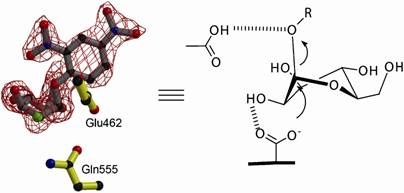Total synthesis of a phosphatase inhibitor reveals an unexpected selectivity profile: A new basis for drugs?
A large number of different Phosphatases, enzymes that split phosphate groups off proteins, play a key role in the regulation of cellular processes. Interest in substances that selectively inhibit specific phosphatases is thus correspondingly high. German researchers were recently surprised when they "reproduced" a previously described phophatase inhibitor with known antitumor activity. The inhibitor had a completely different selectivity profile than that previously ascribed to it - possibly making the substance even more interesting.
Alois Fürstner and Fabian Feyen of the Max-Planck-Institute for Carbon Research in Mülheim an der Ruhr, and Heino Prinz and Herbert Waldmann of the Max-Planck-Institute for Molecular Physiology in Dortmund had taken on a total synthesis of TMC-69-6H that was based on the process for the production of a natural product in fungi. A total synthesis is the reproduction of a (natural) substance from individual building blocks in order to clarify its exact structure and to make larger quantities available for further studies. An unusual palladium-catalyzed coupling between two carbon atoms was the key step in the synthesis of this particular molecular framework, which consists of several rings. However, the success of the synthesis was followed by disappointment. It proved to be impossible to corroborate the previously reported strong inhibition of the cell-cycle regulator Cdc2-phosphatase by TMC-69-6H, which was the supposed reason for its antitumor activity.
However, the effort wasn't in vain, because the antitumor activity of TMC-69-6H remains undisputed. The experiments by the MPI-researchers showed that TMC-69-6H does not inhibit Cdc25-phosphatase, but rather various other phosphatases, such as PTB 1B and PP1. PTB 1B is a central regulator for the activity of the insulin receptor. Inhibitors of phosphatase PTB 1B are being considered as candidates for the treatment of type II diabetes, insulin resistance, and obesity. Like the Cdc25 phospatases, phosphatase PP1 plays an important role in the regulation of the cell cycle. PP1 inhibitors should thus act as powerful cytostatics.
"Inhibitors for phosphatases PBT 1B and PP1 are already being intensively investigated," says Fürstner. "Compounds like TMC-69-6H have not been taken under consideration so far, and could bring a breath of fresh air to pharmaceutical research."
Other news from the department science
Most read news
More news from our other portals
See the theme worlds for related content
Topic world Synthesis
Chemical synthesis is at the heart of modern chemistry and enables the targeted production of molecules with specific properties. By combining starting materials in defined reaction conditions, chemists can create a wide range of compounds, from simple molecules to complex active ingredients.

Topic world Synthesis
Chemical synthesis is at the heart of modern chemistry and enables the targeted production of molecules with specific properties. By combining starting materials in defined reaction conditions, chemists can create a wide range of compounds, from simple molecules to complex active ingredients.






























































